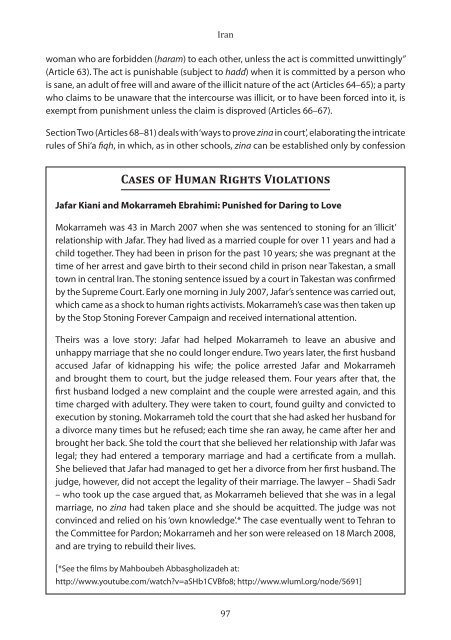control and sexuality
control and sexuality
control and sexuality
- No tags were found...
Create successful ePaper yourself
Turn your PDF publications into a flip-book with our unique Google optimized e-Paper software.
Iranwoman who are forbidden (haram) to each other, unless the act is committed unwittingly”(Article 63). The act is punishable (subject to hadd) when it is committed by a person whois sane, an adult of free will <strong>and</strong> aware of the illicit nature of the act (Articles 64–65); a partywho claims to be unaware that the intercourse was illicit, or to have been forced into it, isexempt from punishment unless the claim is disproved (Articles 66–67).Section Two (Articles 68–81) deals with ‘ways to prove zina in court’, elaborating the intricaterules of Shi‘a fiqh, in which, as in other schools, zina can be established only by confessionCases of Human Rights ViolationsJafar Kiani <strong>and</strong> Mokarrameh Ebrahimi: Punished for Daring to LoveMokarrameh was 43 in March 2007 when she was sentenced to stoning for an ‘illicit’relationship with Jafar. They had lived as a married couple for over 11 years <strong>and</strong> had achild together. They had been in prison for the past 10 years; she was pregnant at thetime of her arrest <strong>and</strong> gave birth to their second child in prison near Takestan, a smalltown in central Iran. The stoning sentence issued by a court in Takestan was confirmedby the Supreme Court. Early one morning in July 2007, Jafar’s sentence was carried out,which came as a shock to human rights activists. Mokarrameh’s case was then taken upby the Stop Stoning Forever Campaign <strong>and</strong> received international attention.Theirs was a love story: Jafar had helped Mokarrameh to leave an abusive <strong>and</strong>unhappy marriage that she no could longer endure. Two years later, the first husb<strong>and</strong>accused Jafar of kidnapping his wife; the police arrested Jafar <strong>and</strong> Mokarrameh<strong>and</strong> brought them to court, but the judge released them. Four years after that, thefirst husb<strong>and</strong> lodged a new complaint <strong>and</strong> the couple were arrested again, <strong>and</strong> thistime charged with adultery. They were taken to court, found guilty <strong>and</strong> convicted toexecution by stoning. Mokarrameh told the court that she had asked her husb<strong>and</strong> fora divorce many times but he refused; each time she ran away, he came after her <strong>and</strong>brought her back. She told the court that she believed her relationship with Jafar waslegal; they had entered a temporary marriage <strong>and</strong> had a certificate from a mullah.She believed that Jafar had managed to get her a divorce from her first husb<strong>and</strong>. Thejudge, however, did not accept the legality of their marriage. The lawyer – Shadi Sadr– who took up the case argued that, as Mokarrameh believed that she was in a legalmarriage, no zina had taken place <strong>and</strong> she should be acquitted. The judge was notconvinced <strong>and</strong> relied on his ‘own knowledge’.* The case eventually went to Tehran tothe Committee for Pardon; Mokarrameh <strong>and</strong> her son were released on 18 March 2008,<strong>and</strong> are trying to rebuild their lives.[*See the films by Mahboubeh Abbasgholizadeh at:http://www.youtube.com/watch?v=aSHb1CVBfo8; http://www.wluml.org/node/5691]97


